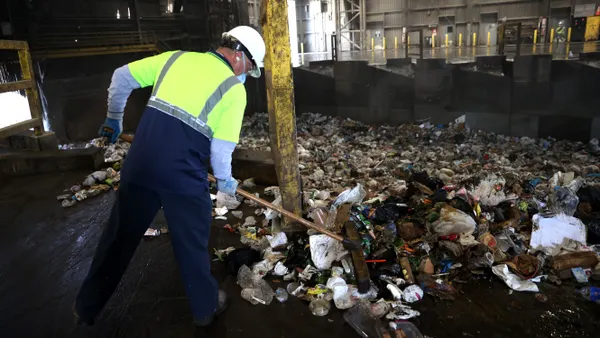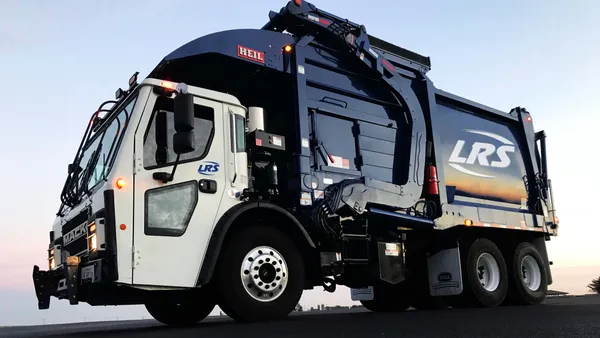Dive Brief:
- The industry has benefited greatly from corporate tax cuts, but don't expect them to send any of those savings back to customers. "They're not giving up price. It's the one thing they know they have control over," said Michael E. Hoffman, managing director of environmental services research at Stifel, during SWANApalooza in Denver. Instead, Hoffman said to expect additional capital investment, stock buybacks and dividends.
- If anything, Hoffman thinks companies should be making more money from services such as recycling, based on the costs involved. "The collection side of the industry has been undercharging for collection of recyclables since the late '80s," he said. "They're happy to do the service, they're happy to put the capital to work. They just need to generate a reasonable return on it."
- With China showing no sign of reversal, Hoffman said higher prices and greater honesty are needed. He isn't expecting the 0.5% contamination standard to be relaxed for at least a few years, and thinks Chinese companies could even open paper mills in the U.S. — but that would also be years away. In the meantime, bargain prices on mixed paper have opened up new markets in other countries, while the U.S. paper industry will likely wait to invest in any new processing capacity until prices stabilize.
Dive Insight:
Whether it's on earnings calls or at conferences, Hoffman's thoughts on the industry are closely monitored. Based on underlying trends in the U.S. economy, including a housing start rate that he doesn't expect will peak until 2020, Hoffman remains confident in the industry's economic prospects, especially now that tax cuts have passed.
According to him, waste companies had fewer options to shield its pre-tax income — outside of depreciation and amortization — than those in other industries, so the tax cuts will make a big difference. Hoffman's previous comments on tax effects have borne out in the latest round of earnings reports. All of the industry's publicly traded companies are confident they're in for a good year, despite recycling headwinds.
Some would say this is because these companies are more geared toward profiting from disposal than recycling. Disposal revenues for all of the big players are higher than their recycling revenues. Hoffman disputed this characterization, saying that landfills are already "sunk costs," and that companies "haven't bought new land meaningfully in a decade."
He pointed to Waste Management's plans to increase recycling capacity to 20 million tons in the next five years and the fact that developing new landfill cells is often an expensive proposition.
With this and other factors in mind, Hoffman estimates the U.S. will be down from about 1,500 landfills to under 1,000 within 10 years. As capacity decreases in some regions, average national tip fees are expected to rise from $50 to $80.
Whether this translates into more resource recovery — not just diversion, but actual recycling into new products — depends largely on economics. Regulatory drivers will make a difference for streams such as organic waste, but currently Hoffman feels "it doesn't work economically."
He shared similar thoughts on glass, and lamented the concurrent rise in recycling expectations along with more complex types of packaging. An uptick in e-commerce boxes (unless other companies take the Amazon approach of padded envelopes) was seen as promising.
As China continues its crackdown on "foreign garbage," these types of economic conversations around recycling will become harder to avoid. Many municipalities and commercial customers are having them with service providers right now.
Based on the view of Hoffman and others in industry finance, it has become increasingly apparent, to those who didn't already know, that curbside recycling service isn't meant to be altruistic. For customers that have grown accustomed to frequent consumption and easy disposal, and the many municipalities that chose to privatize collection and processing, this has made for an unwelcome realization.











